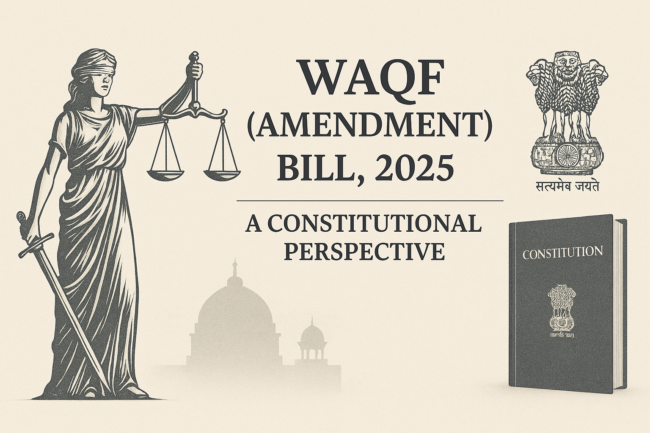🧱 Introduction
The Waqf (Amendment) Bill, 2025, aims to improve how Waqf properties are managed across India. It brings changes to make the system more transparent, fair, and legally secure. However, many people are asking whether these changes violate the Indian Constitution, especially Article 14, which guarantees equality before the law.
⚖️ What is Article 14?
Article 14 of the Indian Constitution says that everyone is equal in the eyes of the law. It also means that the government cannot make unfair or arbitrary laws. But Article 14 doesn’t stop the government from treating people differently if there is a good reason. The State can classify individuals or groups differently if the classification is based on intelligible differentia, and the differentia has a rational nexus to the objective of the legislation.
Let’s apply this to some key sections of the Waqf (Amendment) Bill, 2025.
🔍 Key Provisions in the Bill – Seen Through Article 14
✉️ Section 3A: Only a Lawful Owner Can Create a Waqf
This section says that a person must legally own a property to declare it as Waqf. Earlier, there were cases where people declared Waqf over land they didn’t own, causing confusion and long court cases.
Why it matters: This change prevents fraud and protects the rights of real owners. It stops people from misusing religious laws to claim land illegally.
Is it fair? Yes. It treats all property owners equally and ensures only valid Waqf properties are created.
✉️ Section 3C: Government Land Cannot Be Declared as Waqf
This section bans Waqf claims on land owned by the government.
Why it matters: In the past, public parks, roads, and government offices were sometimes wrongly claimed as Waqf. This hurt public interest.
Is it fair? Yes. Government land is meant for public use. This rule protects it from misuse.
✉️ Section 3B: Digital Record of Waqf Properties
This part creates a central online record of all Waqf properties. This helps prevent duplicate claims, loss of records, and allows the public to know if a property is Waqf.
Is it fair? Yes. It promotes transparency and helps avoid mistakes or misuse.
🏛️ What the Courts Say – Important Legal Judgments
The Supreme Court has explained how Article 14 works in many cases. Here are a few:
- E.P. Royappa v. State of Tamil Nadu (1974):Equality and arbitrariness are opposites. If something is arbitrary, it is not equal.
- Ramana Dayaram Shetty v. International Airport Authority (1979):The government must act fairly and not discriminate without reason.
In both cases, the Court said that fairness and reason are the heart of Article 14.
📘 Final Opinion
After looking at the key parts of the Waqf (Amendment) Bill, 2025, I believe that the changes:
- Are based on good reasons (like preventing fraud and protecting public land)
- Treat people fairly, and
- Promote transparency and accountability
None of the provisions create unfair advantages or discriminate without a reason. They are aimed at improving the system and making it easier for everyone to understand and follow the law.
So, in my legal opinion, the Bill is not against Article 14. In fact, it follows the spirit of equality by reducing misuse and ensuring lawful ownership.
Disclaimer: Adv. M. K. Soni is a legal practitioner and policy analyst. He is the founder of TheKnowledgeNexus.com, a platform focused on decoding laws, constitutional values, and public policy for students, professionals, and informed citizens.


